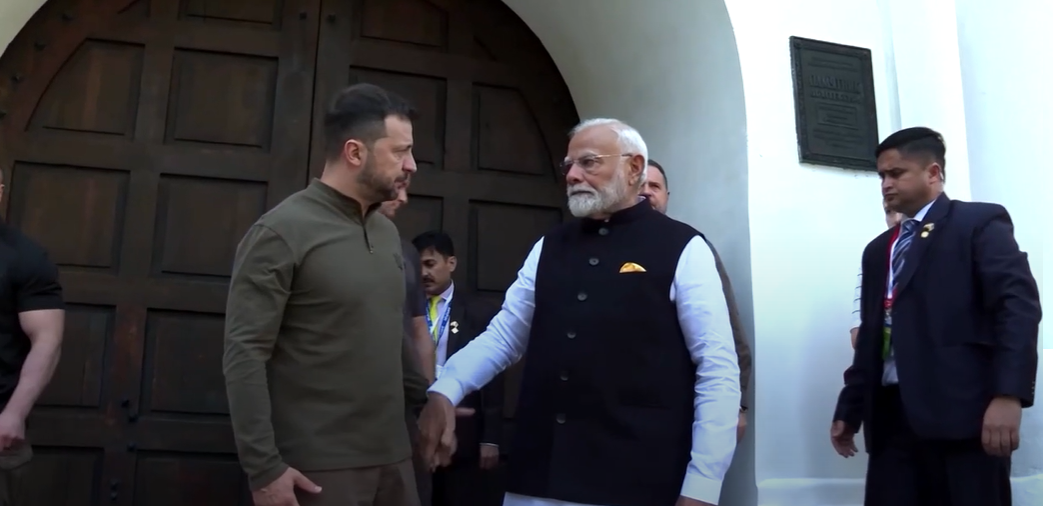World News
Indian Prime Minister Modi Meets Zelensky: A Detailed Analysis of a Pivotal Diplomatic Engagement

In August 2024, Indian Prime Minister Narendra Modi met with Ukrainian President Volodymyr Zelensky in Kyiv, marking a significant moment in international diplomacy amid the ongoing war between Ukraine and Russia. This meeting underscored India’s growing role on the global stage as a potential mediator in international conflicts, reflecting Modi’s strategic foreign policy approach that seeks to balance relationships with major global powers while promoting peace and stability.
This detailed analysis examines the background and context of the Modi-Zelensky meeting, the key discussions and outcomes of their engagement, the broader implications for India’s foreign policy, and the international response to this significant diplomatic initiative.
Background: The Ukraine-Russia Conflict and India’s Position
The conflict between Ukraine and Russia, which began in February 2022 with Russia’s invasion of Ukraine, has had profound implications for global security, economics, and diplomacy. The war has led to thousands of deaths, widespread destruction, and a significant displacement of populations, triggering one of the largest humanitarian crises in recent history. As the conflict dragged on into its third year, diplomatic efforts to end the war have intensified, with various nations and international organizations attempting to broker peace.
India, under Prime Minister Modi, has maintained a delicate balancing act in its approach to the Ukraine-Russia conflict. Historically, India has had strong ties with Russia, dating back to the Cold War era when the Soviet Union was a key ally. Russia continues to be a major defense partner for India, supplying a significant portion of India’s military hardware. Additionally, India and Russia share long-standing economic and cultural ties, which have been reinforced over the decades.
On the other hand, India has also developed robust relations with Western countries, including the United States and members of the European Union, who have been critical of Russia’s actions in Ukraine. As a result, India has carefully navigated the diplomatic landscape, often abstaining from United Nations votes condemning Russia while simultaneously expressing concern over the humanitarian impact of the conflict and calling for dialogue and peace.
Modi’s meeting with Zelensky is significant in this context, as it signals India’s willingness to engage more directly in efforts to resolve the conflict, potentially positioning itself as a mediator between the warring parties.
The Modi-Zelensky Meeting: Key Discussions and Outcomes
The meeting between Prime Minister Modi and President Zelensky took place in Kyiv, a location that has become emblematic of Ukrainian resistance against Russian aggression. The discussions between the two leaders were focused on several key areas:
1. Peace Initiatives and Ceasefire Prospects:
One of the central topics of discussion was the possibility of a ceasefire and the conditions under which peace negotiations could be initiated. Zelensky emphasized Ukraine’s position, which has consistently called for the withdrawal of Russian forces from occupied territories as a precondition for any meaningful peace talks. Modi, while acknowledging Ukraine’s sovereignty and right to defend itself, reiterated India’s stance that dialogue and diplomacy are the only viable paths to lasting peace.
Modi proposed a phased approach to peace, suggesting initial confidence-building measures such as localized ceasefires, humanitarian corridors, and prisoner exchanges. This approach aligns with India’s broader diplomatic philosophy of incremental progress through dialogue rather than abrupt, all-encompassing agreements.
2. Humanitarian Assistance:
Another critical area of discussion was the humanitarian crisis resulting from the war. Modi expressed deep concern over the plight of civilians in conflict zones, particularly in regions that have seen intense fighting, such as Donetsk and Luhansk. India, which has a long history of providing humanitarian aid, has already sent several shipments of medical supplies, food, and other essential goods to Ukraine.
During the meeting, Modi announced additional humanitarian assistance, including the deployment of medical teams and the provision of shelter materials for displaced persons. This move underscores India’s commitment to alleviating the human suffering caused by the conflict, even as it maintains its neutral stance on the political aspects of the war.
3. Economic and Energy Security:
The economic impact of the war, both regionally and globally, was another significant topic of discussion. Ukraine’s economy has been devastated by the conflict, with critical infrastructure destroyed and millions of people displaced. Zelensky sought India’s support in post-war reconstruction efforts, particularly in sectors such as agriculture, infrastructure, and energy.
Modi, recognizing the importance of economic stability in achieving long-term peace, indicated India’s willingness to contribute to Ukraine’s reconstruction. He also highlighted the global energy security challenges posed by the war, particularly the disruption of oil and gas supplies from Russia, which has affected energy markets worldwide, including in India.
India, which imports a significant portion of its energy needs, has been impacted by the volatility in global energy markets. Modi and Zelensky discussed potential collaborations in the energy sector, including investments in renewable energy projects in Ukraine, which could help reduce the country’s dependence on Russian energy supplies in the future.
4. Strengthening Bilateral Relations:
Beyond the immediate concerns of the war, Modi and Zelensky also discussed ways to strengthen bilateral relations between India and Ukraine. While the war has understandably dominated Ukraine’s foreign policy agenda, Zelensky expressed interest in deepening economic and cultural ties with India.
Modi reciprocated, suggesting that the two countries explore opportunities for cooperation in areas such as information technology, pharmaceuticals, and education. The leaders agreed to establish a bilateral working group to identify specific projects and initiatives that could be pursued once the conflict has subsided.
5. India’s Role in Global Diplomacy:
Finally, the meeting provided an opportunity for Modi to articulate India’s broader vision for global diplomacy. As the leader of the world’s largest democracy, Modi emphasized India’s commitment to a rules-based international order, respect for sovereignty, and the peaceful resolution of disputes. He positioned India as a bridge between East and West, capable of engaging with both sides of the conflict to facilitate dialogue.
Zelensky, while appreciative of India’s diplomatic efforts, stressed the urgency of the situation and the need for concrete actions to bring about an end to the war. He urged India to use its influence with Russia to press for a cessation of hostilities, a request that reflects the high stakes involved in the ongoing conflict.
Implications for India’s Foreign Policy
The Modi-Zelensky meeting has significant implications for India’s foreign policy, both in the context of the Ukraine-Russia conflict and more broadly.
1. Balancing Relations with Russia and the West:
One of the most challenging aspects of India’s foreign policy in the context of the Ukraine-Russia conflict has been balancing its historical ties with Russia against its growing relations with Western countries. Modi’s engagement with Zelensky is a clear indication that India is willing to engage more actively with Ukraine and the West while maintaining its strategic partnership with Russia.
This balancing act is crucial for India, which relies on Russia for defense supplies and energy resources but also seeks to strengthen its economic and strategic ties with the United States and European countries. By positioning itself as a potential mediator, India is attempting to navigate this complex diplomatic landscape without alienating either side.
2. India’s Role as a Mediator:
The meeting also highlights India’s potential role as a mediator in international conflicts. Historically, India has played a limited role in global conflict resolution, focusing instead on its regional interests in South Asia. However, as India’s global influence has grown, there has been increasing recognition of its potential to contribute to peace and stability on a broader scale.
Modi’s discussions with Zelensky suggest that India is willing to take on a more active role in mediating conflicts, particularly those that have global implications. This is consistent with India’s broader foreign policy objective of being recognized as a responsible global power that contributes to international peace and security.
3. Strengthening India’s Global Image:
The Modi-Zelensky meeting also serves to enhance India’s global image as a country that is committed to peace and diplomacy. By engaging directly with Zelensky and discussing concrete steps toward peace, Modi has demonstrated that India is not just a passive observer of global events but an active participant in shaping them.
This is particularly important in the context of India’s aspirations for a permanent seat on the United Nations Security Council. As India seeks to play a larger role in global governance, its involvement in high-stakes diplomacy, such as the Ukraine-Russia conflict, bolsters its credentials as a key player on the world stage.
4. Impact on India-Russia Relations:
While Modi’s meeting with Zelensky is a significant diplomatic achievement, it also presents potential challenges for India-Russia relations. Russia is unlikely to view India’s engagement with Ukraine positively, especially if it perceives India as siding with the West in the conflict. However, Modi’s careful positioning during the meeting, emphasizing dialogue and peace rather than taking a hard stance against Russia, suggests that India is aware of these sensitivities.
Going forward, India will need to manage its relationship with Russia carefully, ensuring that its efforts to promote peace in Ukraine do not undermine its strategic partnership with Moscow. This will require ongoing diplomatic engagement with Russia, as well as clear communication of India’s intentions and objectives.
International Response to the Modi-Zelensky Meeting
The international response to the Modi-Zelensky meeting has been largely positive, with many countries and international organizations welcoming India’s diplomatic engagement.
1. Western Reactions:
Western countries, particularly the United States and members of the European Union, have expressed support for Modi’s efforts to engage with Zelensky and explore potential pathways to peace. CNN reported that U.S. officials see India’s involvement as a positive development that could help bridge the gap between Russia and Ukraine, given India’s unique position as a friend to both nations.
The European Union, which has been at the forefront of efforts to support Ukraine, also welcomed the meeting. The Guardian noted that EU leaders view India’s diplomatic efforts as complementary to their own, particularly in terms of promoting dialogue and reducing tensions.
2. Russian Reaction:
Russia’s reaction to the meeting has been more cautious. While there has been no official condemnation from Moscow, Russian state media have downplayed the significance of the meeting, suggesting that it is unlikely to result in any meaningful change in the situation on the ground. However, Russian officials have privately expressed concern that India’s engagement with Ukraine could strain the traditionally strong ties between Moscow and New Delhi.
3. Ukraine’s Perspective:
From Ukraine’s perspective, the meeting with Modi is seen as a valuable opportunity to garner international support for its position. Zelensky’s government has been keen to engage with countries beyond the West, recognizing that broadening its base of support is crucial for both military and diplomatic reasons. Reuters highlighted that Ukrainian officials are hopeful that India’s involvement could lead to increased pressure on Russia to cease hostilities.
4. Broader International Reactions:
The broader international community has reacted with interest to the Modi-Zelensky meeting, viewing it as a significant moment in the ongoing efforts to resolve the Ukraine-Russia conflict. Many countries in the Global South, which have often felt sidelined in global diplomacy, see India’s engagement as a positive development that reflects the growing influence of emerging powers in shaping international affairs.
Conclusion
The meeting between Indian Prime Minister Narendra Modi and Ukrainian President Volodymyr Zelensky marks a significant moment in international diplomacy, particularly in the context of the ongoing war between Ukraine and Russia. By engaging directly with Zelensky, Modi has positioned India as a potential mediator in the conflict, reflecting India’s broader ambitions to play a more active role in global peace and security.
The discussions between Modi and Zelensky covered key issues such as peace initiatives, humanitarian assistance, economic reconstruction, and energy security, all of which have far-reaching implications for the region and beyond. The meeting also underscores the delicate balancing act that India must perform as it navigates its relationships with both Russia and the West.
As the conflict in Ukraine continues, India’s role in the diplomatic efforts to resolve the crisis will be closely watched. The Modi-Zelensky meeting is a testament to India’s growing influence on the global stage and its commitment to promoting dialogue and peace in an increasingly complex and polarized world.
-

 Food8 hours ago
Food8 hours agoHow to Lose Weight Fast: The Best Drink Recipes for Rapid Results
-

 Education8 hours ago
Education8 hours agoUnlocking the ASUS Student Discount on Reddit: A Comprehensive Guide
-

 News48 minutes ago
News48 minutes agoUnfiltered: Behind the Headlines with Page Six
-

 Banking5 hours ago
Banking5 hours agoUnlock Your Financial Potential with SoFi High-Yield Savings
















